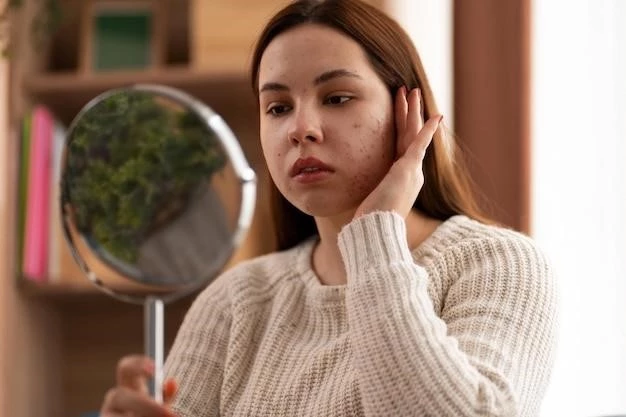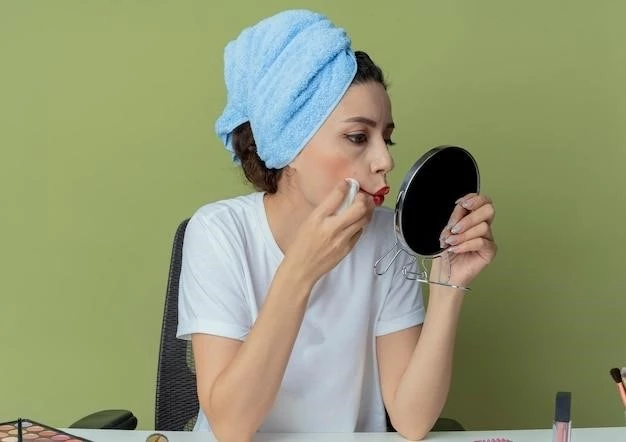Understanding and Managing Acne Rosacea
Causes of Acne Rosacea⁚ While the exact cause is unknown, factors like genetics, immune system abnormalities, and environmental triggers can contribute.
Symptoms and Diagnosis of Acne Rosacea⁚ Common symptoms include facial redness, visible blood vessels, and pimple-like bumps. A dermatologist can diagnose based on a physical exam.
Treatment Options for Acne Rosacea⁚ Treatments may include topical medications, oral antibiotics, laser therapy, and lifestyle changes to manage symptoms.
Causes of Acne Rosacea
Acne rosacea’s exact cause is not fully understood, but several factors may contribute to this skin condition. Genetics can play a role, as rosacea tends to run in families. Abnormalities in the immune system, resulting in inflammation, are also thought to be involved.
Environmental triggers can worsen rosacea symptoms. Common triggers include sun exposure, hot weather, spicy foods, alcohol, stress, and certain skincare products. These triggers can lead to the dilation of blood vessels in the face, causing redness and other symptoms.
Some research suggests that a microscopic mite called Demodex folliculorum, which naturally lives on human skin, may be more abundant in individuals with rosacea. However, the relationship between this mite and rosacea is still being studied.
People with fair skin, particularly those of Northern European descent, are more prone to developing rosacea. Hormonal fluctuations, such as those experienced by women during menopause, may also influence the development of acne rosacea.
While the precise causes of acne rosacea may be multifaceted and not entirely clear, understanding potential triggers and risk factors can help individuals manage their condition more effectively through lifestyle changes, skincare routines, and treatment options.
Symptoms and Diagnosis of Acne Rosacea
The symptoms of acne rosacea can vary from person to person and may include facial redness, visible blood vessels, bumps resembling acne, thickened skin, and eye irritation. Flare-ups can be triggered by factors like sun exposure, stress, or certain foods.
It is important to consult a dermatologist for an accurate diagnosis; A dermatologist will perform a physical examination of the skin and discuss the individual’s medical history and symptoms. In some cases, additional tests may be conducted to rule out other skin conditions that may mimic rosacea.
Since symptoms of acne rosacea can resemble other skin conditions like eczema or lupus, a professional diagnosis is crucial for effective treatment. Once diagnosed, the dermatologist can recommend a personalized treatment plan to manage the symptoms and improve the overall skin condition.
Early detection and proper diagnosis can help individuals with acne rosacea better understand their condition and take steps to manage it effectively. Dermatologists can offer expert guidance on suitable treatments and lifestyle adjustments to minimize flare-ups and promote skin health.
Treatment Options for Acne Rosacea
There are various treatment options available to manage the symptoms of acne rosacea and improve the quality of the skin. The choice of treatment depends on the severity of the condition and individual preferences. Here are some common treatment approaches⁚
- Topical Medications⁚ Dermatologists may prescribe topical creams or gels containing ingredients like azelaic acid, metronidazole, or sulfur to reduce inflammation and redness.
- Oral Medications⁚ In more severe cases, oral antibiotics like doxycycline or isotretinoin may be recommended to control symptoms.
- Laser Therapy⁚ Procedures like intense pulsed light (IPL) or vascular laser therapy can help reduce redness and visible blood vessels associated with rosacea.
- Brimonidine Gel⁚ This topical medication can temporarily reduce facial redness by constricting blood vessels.
- Skincare Products⁚ Using gentle cleansers, moisturizers, and sunscreen tailored for sensitive skin can help maintain skin health and reduce irritation.
- Lifestyle Adjustments⁚ Managing stress, avoiding triggers like spicy foods and alcohol, and protecting the skin from sun exposure are key strategies for minimizing flare-ups.
It is essential to work closely with a dermatologist to determine the most suitable treatment plan for acne rosacea. Complying with the prescribed regimen and making necessary lifestyle changes can lead to significant improvements in skin appearance and overall well-being.
Lifestyle Changes to Manage Acne Rosacea
Adopting certain lifestyle changes can help individuals effectively manage acne rosacea and reduce the frequency of flare-ups. Here are some beneficial practices to incorporate into your routine⁚
- Sun Protection⁚ Use a broad-spectrum sunscreen daily to shield your skin from harmful UV rays, which can trigger rosacea symptoms.
- Gentle Skincare⁚ Avoid harsh exfoliants and abrasive scrubs that can irritate the skin. Opt for mild, non-comedogenic products suitable for sensitive skin.
- Stress Management⁚ Practice relaxation techniques like deep breathing, yoga, or meditation to minimize stress levels, a common trigger for flare-ups.
- Dietary Modifications⁚ Identify and avoid foods that tend to exacerbate your rosacea symptoms, such as spicy dishes, hot beverages, or alcohol.
- Temperature Control⁚ Stay cool in warm weather to prevent flushing, and use a humidifier in dry environments to maintain skin hydration.
- Gentle Makeup⁚ Choose non-irritating, hypoallergenic cosmetics and make sure to remove them thoroughly at the end of the day.
By incorporating these lifestyle changes into your daily routine, you can help manage acne rosacea more effectively and promote healthier skin overall. Consistency in implementing these practices and being mindful of your skin’s reactions can make a significant difference in controlling your condition.
Skincare Routine for Acne Rosacea
Developing a gentle and consistent skincare routine is key to managing acne rosacea while maintaining healthy skin. Consider the following tips when creating a skincare regimen tailored to your needs⁚
- Cleansing⁚ Use a mild, non-irritating cleanser formulated for sensitive skin to wash your face twice daily. Avoid harsh scrubs or abrasive ingredients.
- Moisturizing⁚ Choose a fragrance-free, non-comedogenic moisturizer to keep your skin hydrated without clogging pores. Apply after cleansing and throughout the day as needed.
- Sun Protection⁚ Apply a broad-spectrum sunscreen with an SPF of 30 or higher every morning, even on cloudy days, to protect your skin from UV exposure.
- Makeup Selection⁚ Opt for mineral-based or non-comedogenic makeup products to minimize skin irritation. Remove makeup gently with a mild cleanser before bed.
- Avoid Irritants⁚ Steer clear of products containing alcohol, fragrances, exfoliating agents, and other irritants that can trigger rosacea flare-ups.
- Patch Test⁚ When introducing new products, perform a patch test on a small area of skin to check for any adverse reactions before applying them to your face.
Consulting with a dermatologist can help you personalize your skincare routine based on your skin type and specific rosacea symptoms. Consistency in using gentle products and avoiding triggers can contribute to calmer, healthier skin in the long term.
Impact of Diet on Acne Rosacea
The relationship between diet and acne rosacea is a complex and individualized one. While specific foods may not directly cause rosacea, certain dietary choices can trigger flare-ups and exacerbate symptoms in some individuals. Here are some dietary considerations to help manage acne rosacea⁚
- Identify Triggers⁚ Keep a food diary to pinpoint any correlations between your diet and rosacea flare-ups. Common triggers include spicy foods, hot beverages, alcohol, and histamine-rich foods.
- Anti-Inflammatory Foods⁚ Incorporate foods rich in antioxidants and omega-3 fatty acids, such as fruits, vegetables, fish, and nuts, to help reduce inflammation and support skin health.
- Hydration⁚ Stay well-hydrated by drinking plenty of water throughout the day. Proper hydration can help maintain skin moisture and overall well-being.
- Moderation⁚ While it’s essential to be mindful of trigger foods, it’s also important to enjoy a balanced diet that includes a variety of nutrients for optimal health.
- Consult a Professional⁚ If you suspect certain foods are impacting your rosacea, consider consulting with a dermatologist or a registered dietitian for personalized dietary recommendations.
Remember that individual responses to dietary changes can vary, so it’s crucial to pay attention to how your skin reacts to different foods and make informed choices based on your observations. By being proactive about your diet and making mindful selections, you may be able to better manage your acne rosacea symptoms and improve your overall skin health.

Psychological Effects of Acne Rosacea
Acne rosacea not only impacts the skin physically but can also have psychological effects on individuals. Dealing with visible symptoms like facial redness and bumps can lead to feelings of self-consciousness, low self-esteem, and emotional distress. Here are some ways to address the psychological effects of acne rosacea⁚
- Support System⁚ Surround yourself with understanding friends and family members who can offer emotional support and reassurance.
- Open Communication⁚ Talk to a therapist or counselor about your feelings regarding your skin condition. They can provide coping strategies and help you build resilience.
- Positive Self-Talk⁚ Practice self-compassion and challenge negative thoughts about your appearance. Focus on your strengths and inner qualities.
- Mindfulness Techniques⁚ Engage in mindfulness practices like meditation or deep breathing exercises to reduce stress and promote emotional well-being.
- Seek Professional Help⁚ If feelings of anxiety or depression persist, consider seeking professional help from a mental health professional to address any psychological challenges.
Remember, it’s essential to prioritize your mental health alongside your physical well-being when managing acne rosacea. Taking steps to address the psychological impact of your skin condition can lead to improved self-confidence and a more positive outlook on managing your symptoms.
Managing Flare-ups of Acne Rosacea
Effectively managing flare-ups of acne rosacea involves a combination of preventive measures and responsive strategies. By being proactive and prepared, you can minimize the impact of flare-ups on your skin. Here are some helpful tips for managing flare-ups⁚
- Identify Triggers⁚ Keep track of potential triggers like sun exposure, stress, spicy foods, or certain skincare products to avoid or minimize them.
- Gentle Skincare⁚ Stick to a mild skincare routine using products designed for sensitive skin. Avoid harsh chemicals and abrasive scrubs that can irritate the skin.
- Stay Hydrated⁚ Drink an adequate amount of water to help maintain skin hydration and support overall skin health.
- Protect Your Skin⁚ Use sunscreen daily, wear protective clothing, and seek shade to shield your skin from UV rays, a common trigger for rosacea flare-ups.
- Manage Stress⁚ Practice stress-reducing techniques such as yoga, meditation, or deep breathing exercises to keep stress levels in check.
- Consult Your Dermatologist⁚ If flare-ups persist or worsen, consult your dermatologist. They can adjust your treatment plan or recommend additional strategies to manage symptoms.
By taking a proactive approach to managing flare-ups and being mindful of your triggers and skincare routines, you can help prevent and minimize the impact of acne rosacea flare-ups on your skin. Consistency, patience, and a holistic approach to skincare and lifestyle choices are crucial in managing this skin condition effectively.
